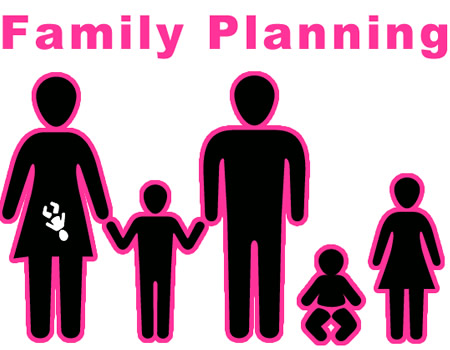Family planning, child spacing: A veritable tool in tackling social problems in Nigeria
Family planning, child spacing: A veritable tool in tackling social problems in Nigeria
By Musliudeen Adebayo

There is no other definition or meaning we can give to the alarming rate of maternal and child mortality in Nigeria than to call it social problem.
Social problem according to scholars of Social Work is a problem that affects a significant number of people in a particular society. It may be natural and some may be manmade. Social problems serve as impediments to human existence.
There are array of social problems Nigeria is currently battling with. These include: maternal and infant mortality, unemployment, poverty, child abuse, hooliganism, armed robbery, begging and divorce, just to mention a few. These problems are interrelated and interwoven when looking at their causes and effects.
Maternal mortality is simply refers to pregnancy related death. In other words, it is a death that occurs during pregnancy, while giving birth. Maternal mortality rate is the rate of women who lose their lives during pregnancy or while giving birth.
For instance, in 2017, it was reported that Nigeria has the third highest maternal and infant mortality rate.
Infant mortality rate on the other hand is the rate of children who die at birth or shortly after birth.
According to a report from United Nations Children Fund (UNICEF), nearly ten per cent of newborn deaths in the world occurred in Nigeria in 2016. The report noted that five countries accounted for half of all the newborn deaths last year; with Nigeria third in the list.
The report stated that newborn deaths occur mostly in two regions; Southern Asia (39 per cent) and sub- Saharan Africa (38 per cent).
It revealed that India has (24 per cent), Pakistan has (10 per cent) while Nigeria has (9 per cent). Others include Democratic Republic of the Congo with (4 per cent) and Ethiopia which recorded (3 per cent).
The report showed that 15,000 children died globally before their fifth birthday in 2016, with 46 per cent of the deaths, (7,000) occurring in the first 28 days after birth.
However, having realized the above as social problems coupled with complications during child births, high infant mortality rate, abortion among married and unmarried women and over dependence on infrastructure in the areas of health, education among others in Nigeria, some non-governmental organizations have over the years took it upon themselves to map out strategies and put measures in place to ensure that something is done to arrest the issues of maternal mortality, infant mortality and other related issues such as population explosion.
Among the organizations that are currently championing better life for women and their children including their husbands for promotion of peace, economic growth and self-sufficient in Nigeria is Nigerian Urban Reproductive Health Initiative (NURHI) and Development Communications (DEVCOMS) Network.
Others include Association for Reproductive Health (ARFH), Pathfinder International, Pathnership in Child and Family and Health (PACFaH) and CISLAC among others.
Family planning methods which have been certified and recognised include the use of condoms for male and female, the use of IUD, abstinence, implants among others.
NURHI, which is currently working in three states: Oyo, Lagos and Kaduna, in its bid to promote family planning, child spacing and other related issues, has trained and organized various trainings for family planning coordinators, volunteers, traditional rulers, government officials, policy makers and media practitioners to mention just a few.
NURHI Project began in Nigeria in 2009. It started in five states with a view to ensure access to and support for family planning services for the urban poor dwellers.
The organization has also see to the establishment of an advocacy group, Advocacy Network of Nigeria (ANN) which is also working in conjunction with other stakeholders in bringing the gospel of family planning and child spacing to the people.
The organization is currently working with Health Reform Foundation of Nigeria (HERFON), DEVCOMS), and the Futures Institute.
NURHI started its advocacy program at both state and local government levels. This has since yielded positive results because, states and local government areas have been allocating more budgetary allocation in support of family planning.
The organization has also been partnering with media in reportage of its activities especially in the four first phase NURHI cities of Ibadan, Ilorin, Abuja, and Kaduna.
DEVCOMS which has its office on Adeniran Ogunsanya, Surulere, Lagos is handled by carrier and veteran journalists of high repute with a view to provide the necessary media awareness in support of family planning and other related issues.
DEVCOMS, in its bid to ensure that the gospel of family planning and child spacing get to those who need family planning services, has trained print, electronic media journalists, bloggers, social media influencers among other stakeholders in various areas such as news gathering, features writing and investigate reports.
The organization had established a database of trained media representatives in each of the covered areas whom it invites to cover family planning activities, including those organized by NURHI from time to time.
DEVCOMS also works with its media contacts to create opportunities for interviews and discussions with FP Champions, policy-makers, NURHI experts, opinion leaders, traditional rulers among others.
Members of DEVCOMS network also cover family planning activities and also write feature articles.
DEVCOMS and NURHI field offices track the volume of family planning coverage in the media as a means of monitoring its effectiveness and impact.
Musliudeen Adebayo, an Ibadan-based social worker cum journalist writes via baaale85@yahoo.com






